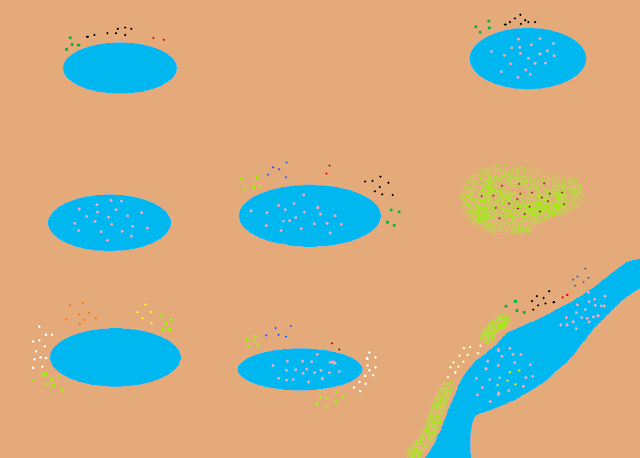Here's a quick summary: it rained in Africa, and the lions are slowly recovering.
The trees have grown back in Siberia, but the caribou have left Alaska, so the wolves will have to find other food sources.
The Ankylosaurs were hit by a sickness, but this isn't doing any damage to the ecosystem.
It rained again in the field.
Finally, a new species appeared in the tide pool: kelp, which brings with it another kind of snail called an abalone.
Showing posts with label lion. Show all posts
Showing posts with label lion. Show all posts
Wednesday, June 15, 2011
Sunday, June 5, 2011
Week 2 of the Ecosystem Project
It is week 2 isn't it?
Anyways, our invertebrates way back in the tide pool are being attacked by a few newcomers: the penpoint gunnel.
In Africa, the lion prides have been hit by a disease. It will take some time for them to recover.
In the Arctic, a dead whale has washed up in Baffin Bay, so our wolverines will be feasting for months.
Meanwhile, some trees are growing back in Siberia.
And finally, our last ecosystem: the dinosaurs!
A lot of these are actually from different time periods. So no complaining!
They are:
Anyways, our invertebrates way back in the tide pool are being attacked by a few newcomers: the penpoint gunnel.
In Africa, the lion prides have been hit by a disease. It will take some time for them to recover.
In the Arctic, a dead whale has washed up in Baffin Bay, so our wolverines will be feasting for months.
Meanwhile, some trees are growing back in Siberia.
And finally, our last ecosystem: the dinosaurs!
A lot of these are actually from different time periods. So no complaining!
They are:
- Tyrannosaurus
- Stegosaurus
- Parasaurolphus
- Ornithomimus
- Quetzalcoatlus
- Utahraptor
- Sauroposeidon
- Alamosaurus
- Acrocanthosaurus
- Deinonychus
- Ankylosaurus
- Triceratops
Labels:
dinosaurs,
ecology,
lion,
penpoint gunnel,
wolverines
Saturday, May 28, 2011
The Circle of Life
Today's ecosystem is the African Savannah.
red dot=lion
black dot=zebra
pink dot=flamingo
cream dot=wildebeest
brown dot=spring hare
light green dot in water=crocodile
dark green dot=bush
light green dot on land=tree
light green smear=grass
orange dot=hyena
grey dot=vulture
yellow dot=giraffe
blue dot=elephant
white dot=baboon
And the unlucky number is...3! In the field, that was succession, but on the savannah, it's going to mean that a group of animals suddenly colonizes a new area. Not like migration, where the whole herd leaves. So here we have flamingos colonizing other watering holes.
This really has no effect on the ecosystem, as nothing really feeds on flamingos.
red dot=lion
black dot=zebra
pink dot=flamingo
cream dot=wildebeest
brown dot=spring hare
light green dot in water=crocodile
dark green dot=bush
light green dot on land=tree
light green smear=grass
orange dot=hyena
grey dot=vulture
yellow dot=giraffe
blue dot=elephant
white dot=baboon
And the unlucky number is...3! In the field, that was succession, but on the savannah, it's going to mean that a group of animals suddenly colonizes a new area. Not like migration, where the whole herd leaves. So here we have flamingos colonizing other watering holes.
This really has no effect on the ecosystem, as nothing really feeds on flamingos.
Subscribe to:
Posts (Atom)









